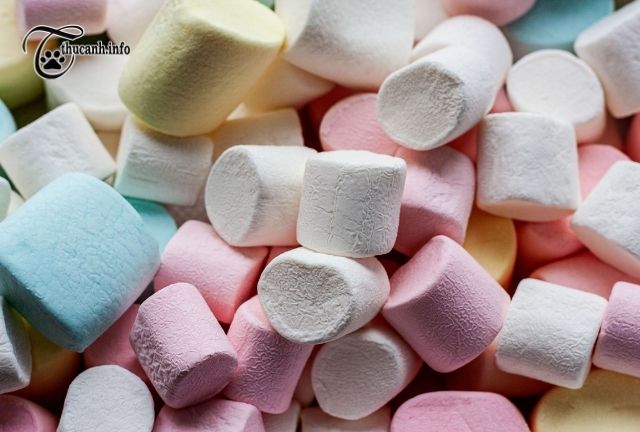If you’re a hamster owner, you might have wondered, “Can hamsters eat marshmallows?” It’s essential to understand what’s safe and suitable for your adorable pet’s diet. In this article, we’ll explore the risks associated with feeding marshmallows to hamsters and introduce healthier alternatives that will keep them happy and healthy.

What Happens If You Feed Your Hamster Marshmallows
1. What Are Marshmallows?
Marshmallows are sweet, fluffy candies that are made from sugar, corn syrup, gelatin, and vanilla extract. They come in different shapes and sizes and are often used as toppings for hot chocolate or roasted over a campfire.
2. Can Hamsters Eat Marshmallows?
No, hamsters should not eat marshmallows. Marshmallows are not a suitable food for hamsters as they are high in sugar and can lead to health problems such as obesity and diabetes. Additionally, the sticky texture of marshmallows can pose a choking hazard to hamsters. It’s best to avoid giving marshmallows to hamsters and opt for healthier treats that are safe and beneficial for their diet.
3. Understanding the Risks of Feeding Marshmallows
3.1. Understanding the Risks
When it comes to feeding marshmallows to hamsters, it’s important to be aware of the potential risks and dangers associated with this sugary treat.
- High Sugar Content: Marshmallows are loaded with sugar, which is not suitable for hamsters. Consuming too much sugar can lead to obesity, diabetes, and tooth decay in these small pets.
- Harmful Ingredients: Marshmallows contain various artificial ingredients and additives that can be harmful to hamsters. These ingredients are not part of their natural diet and can cause digestive issues and other health problems.
- Obesity and Health Issues: Regular consumption of marshmallows can lead to weight gain and various health issues in hamsters. Their small bodies are not equipped to handle excessive amounts of sugar and unhealthy ingredients.
- Choking Hazard: The sticky texture of marshmallows can pose a significant choking hazard for hamsters. These small animals may have difficulty swallowing the marshmallow or get it stuck in their mouth or throat.

Understanding the Risks of Feeding Marshmallows
3.2. The Dangers of Excess Sugar
Can hamsters eat marshmallows? How does excess sugar intake affect the health of Hamsters?
Hamsters are tiny creatures with specific dietary needs, and too much sugar can have severe consequences on their health.
- Obesity: Excessive sugar consumption can lead to obesity in hamsters, just like it does in humans. An overweight hamster may experience reduced mobility, exercise intolerance, and an overall decreased quality of life.
- Diabetes: Hamsters are susceptible to diabetes, and a diet high in sugar can increase the risk of developing this metabolic disorder. Diabetes can lead to various health issues and complications in hamsters.
- Dental Problems: The high sugar content in marshmallows can cause tooth decay and dental issues in hamsters. Dental problems can be painful and affect their ability to eat and groom properly.
- Behavioral Problems: A diet high in sugar can also lead to hyperactivity and erratic behavior in hamsters. They may become restless, agitated, and display unusual behaviors.
4. What Can Hamsters Eat Instead?
Fortunately, there are plenty of safe and nutritious alternatives for your hamster’s treats. Consider introducing the following options into their diet:
4.1. Nutritious Fruits and Vegetables:

there are plenty of safe and nutritious alternatives for your hamster’s treats.
Fresh fruits and vegetables are excellent choices for hamster treats. Apples, carrots, broccoli, peas, and other safe options provide essential vitamins and minerals while adding variety to their diet.
4.2. Cooked Grains:
Cooked grains like rice, quinoa, and oatmeal can be delightful additions to your hamster’s menu. These grains are easy to chew and digest, making them suitable for your furry friend.
4.3. Nuts and Seeds:
Occasional treats of nuts and seeds, such as almonds, sunflower seeds, and pumpkin seeds, can offer healthy fats and proteins for your hamster.
4.4. Commercial Hamster Foods:
Opt for high-quality commercial hamster foods that are specifically formulated to meet their nutritional needs. These foods ensure your hamster receives all the necessary nutrients without the harmful effects of sugary snacks like marshmallows.
5. FAQs
5.1. Can hamsters eat mini marshmallows?
No, even mini marshmallows should be avoided as they still contain high amounts of sugar and can pose a choking hazard.
5.2. Can hamsters eat marshmallow fluff?
No, marshmallow fluff is even worse for hamsters than regular marshmallows as it contains even higher amounts of sugar and artificial flavorings.
5.3. Can hamsters have one marshmallow as a special treat?
It’s best to avoid giving your hamster any marshmallows, even as a special treat. There are plenty of other treat options that are safer and more nutritious.
5.4. What should I do if my hamster eats a marshmallow?
If your hamster accidentally ingests a small piece of marshmallow, they will likely be fine. However, if they eat a large amount or experience any symptoms like vomiting or diarrhea, contact your vet immediately.
Conclusion:
Hamsters should not eat marshmallows due to the potential risks and dangers associated with these sugary treats. Instead, opt for healthy and safe alternatives like fresh fruits, vegetables, grains, nuts, seeds, and commercial hamster foods. Moderation is crucial when offering treats to your furry friend to maintain their health and happiness.
Source: thucanh.info


